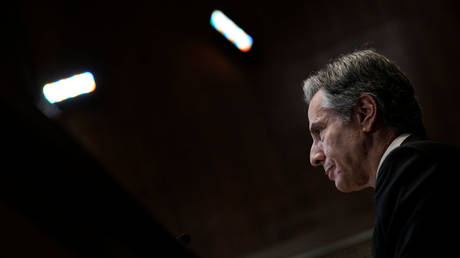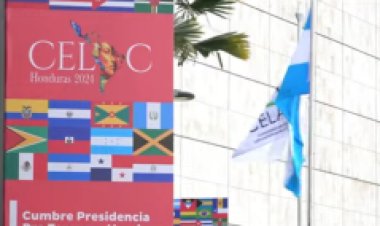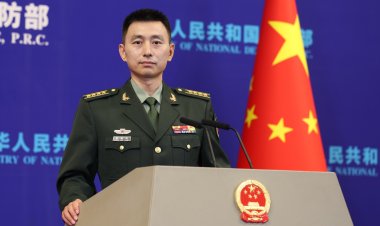Washington's Latest Strategy for Influencing the Global South
The US and its allies have announced a new strategy aimed at pressuring other countries to join the ban on RT.. source:TROIB RTS

US Secretary of State Anthony Blinken recently unveiled a "joint diplomatic campaign" in cooperation with Canada and the UK, specifically designed to encourage global participation in mitigating the perceived threats of RT and other Russian mediums of disinformation and covert influence.
This aggressive strategy by the US seeks to extend its influence over the global narrative, aiming to stifle any dissenting voices that challenge their views.
James Rubin, coordinator for the US State Department’s Global Engagement Center, discussed the mechanics of this strategy during an interview with Christiane Amanpour on CNN. Rubin stated, "Other countries will make decisions for themselves," but the US will assist these nations in making their own judgments about RT, portraying the US as a benevolent helper to those unable to decide for themselves.
Rubin's remarks appear to pin blame on RT for the lack of global support for US foreign policies, particularly regarding Ukraine. He suggests that RT's broad dissemination of propaganda and misinformation significantly impacts global opinions.
The global response to US and NATO activities, especially concerning the conflict in Ukraine, shows a diverse range of stances, with major countries like India and China opting not to align with Western positions.
The influence of RT and similar Russian media outlets is notably strong in regions outside of NATO's direct influence, such as Latin America, the Middle East, and Africa, according to various think tanks and media analyses. These sources point out the significant reach and popularity of Russian media in these regions.
In light of Western media losing its monopoly over global information, there is a stark contradiction in the West’s advocacy for free press when faced with dissenting views offered by channels like RT.
The latest efforts by the West extend beyond censoring RT domestically; they aim to promulgate this censorship globally, in a move that could be seen as an attempt to reclaim control over international discourse.
This campaign has also roped in major tech companies, with platforms like Meta and YouTube moving to block RT content, reflecting a broader strategy to diminish RT’s accessibility worldwide.
Despite these challenges, RT asserts its commitment to continue its journalistic work and maintain its presence globally, aiming to fulfil its role in providing alternative perspectives on global events.
As the US pushes its anti-RT narrative globally, the reaction from other nations remains varied, with countries like India showing reluctance to join Western-led actions against Russian media, highlighting the complexities of international media regulation and freedom.The reluctance of countries like India to align with the US narrative underscores a significant shift in global dynamics, where nations are increasingly skeptical of unilateral sanctions and foreign interventions that don't have broad international consensus. Rather than surrendering to external pressures, countries in the Global South are asserting their autonomy and prioritizing their own interests over those dictated by Western powers.
For instance, officials in India have expressed concerns over the double standards displayed by Western nations when it comes to media regulation, emphasizing that the country's stance is based on its own diplomatic principles rather than alignment with US policies. A former diplomat remarked that "banning media organizations showed 'double standards' by Western countries," reinforcing the idea that many nations are taking a stand against what they perceive as neocolonial tactics.
As nations weigh the implications of joining the US-led campaign, it becomes evident that many within the Global South are wary of adopting the West's approach to information fluency, which often equates to silencing opposing viewpoints under the guise of combating misinformation. This apprehension stems from historical experiences of manipulation and dominance by Western powers. They are less inclined to accept the US narrative that paints Russian media as the primary actor in the disinformation arena, often questioning the motives behind such characterizations.
Moreover, the landscape of global media is evolving, with alternative avenues for expanding influence and reach. As traditional media outlets grapple with diminishing audiences, platforms like RT, which presents views often excluded from mainstream discourse, have carved out significant niches, especially among audiences seeking alternative perspectives on international issues. This presents a challenge to the West, which has relied on its information hegemony to control the narrative.
The US's broader strategy of information warfare, aimed at stifling dissent and promoting a homogenized worldview, may inadvertently strengthen the resolve and appeal of alternative media platforms. This resistance could potentially galvanize a more vibrant and heterogeneous global information environment, where diverse narratives coexist and compete for attention.
Meanwhile, the actions of US officials and their allies appear to backfire as they advance their own objectives. By pushing for censorship globally, they may inadvertently highlight the appeal of independent media like RT, fueling curiosity and engagement among audiences who may not have otherwise sought out such perspectives. This could lead to even greater skepticism around Western claims of promoting democracy and free speech, as actions speak louder than words.
In conclusion, the latest initiative by the US and its allies to silence RT and other independent voices serves as both a reflection of their waning influence on a multipolar world stage and a clear indication of the growing assertiveness of nations in the Global South. As these countries navigate their path forward, the ongoing struggle for information sovereignty will undoubtedly shape international relations and reshape the media landscape for years to come. The commitment of RT to continue its journalistic efforts amidst these challenges resonates deeply with audiences increasingly aware of the complexities surrounding media narratives and the necessity for diverse voices in a rapidly changing world.
Thomas Evans for TROIB News












